Programme Committee
Marco Affronte
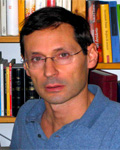 MARCO AFFRONTE is Associate Professor of Physics at University of Modena and team leader at the Institute of NanoScience S3 of CNR in Italy. After graduating in Physics (Laurea at University of Florence I, 1987), he obtained his Ph.D. at Ecole Polytechnique Federale de Lausanne (CH) in 1991 and worked at CNRS in Grenoble (F) in 1992–93. Since 1994 he is at University of Modena where he set up and run a laboratory for low temperature experiments.
MARCO AFFRONTE is Associate Professor of Physics at University of Modena and team leader at the Institute of NanoScience S3 of CNR in Italy. After graduating in Physics (Laurea at University of Florence I, 1987), he obtained his Ph.D. at Ecole Polytechnique Federale de Lausanne (CH) in 1991 and worked at CNRS in Grenoble (F) in 1992–93. Since 1994 he is at University of Modena where he set up and run a laboratory for low temperature experiments.
Konrad Banaszek
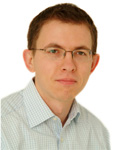 KONRAD BANASZEK is a professor at Faculty of Physics, University of Warsaw since October 2009. After receiving his Ph.D. from the University of Warsaw in 2000 he held postdoctoral positions at the University of Rochester and the University of Oxford, followed by a Junior Research Fellowship at St. John's College, Oxford and a faculty appointment at Nicolaus Copernicus University in Toruń, Poland.
KONRAD BANASZEK is a professor at Faculty of Physics, University of Warsaw since October 2009. After receiving his Ph.D. from the University of Warsaw in 2000 he held postdoctoral positions at the University of Rochester and the University of Oxford, followed by a Junior Research Fellowship at St. John's College, Oxford and a faculty appointment at Nicolaus Copernicus University in Toruń, Poland.
Albert-László Barabási
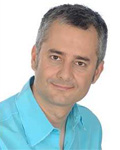 ALBERT-LÁSZLÓ BARABÁSI is a Distinguished University Professor at Northeastern University, where he directs the Center for Complex Network Research, and holds appointments in the Departments of Physics, Computer Science and Biology, as well as in the Department of Medicine, Harvard Medical School and Brigham and Women Hospital, and is a member of the Center for Cancer Systems Biology at Dana Farber Cancer Institute.
ALBERT-LÁSZLÓ BARABÁSI is a Distinguished University Professor at Northeastern University, where he directs the Center for Complex Network Research, and holds appointments in the Departments of Physics, Computer Science and Biology, as well as in the Department of Medicine, Harvard Medical School and Brigham and Women Hospital, and is a member of the Center for Cancer Systems Biology at Dana Farber Cancer Institute.
Michel Cosnard
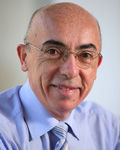 MICHEL COSNARD is Chairman and CEO of INRIA. Previously, Michel Cosnard served as Professor at Ecole Normale Superieure de Lyon and from 1997, as director of the INRIA Research Unit in Lorraine. In 2001, he has been nominated director of the INRIA Research Unit in Sophia Antipolis and served as Professor at the University of Nice - Sophia Antipolis. Michel Cosnard holds a Master of Science degree in 1975 from Cornell University and a Doctorat d'Etat in 1983 from Universite de Grenoble. Michel Cosnard has been member of the FP6 IST Evaluation Committee, chaired by Eskko Aho. He is currently member of ISTAG (Information Society Technologies Advisory Group), and chaired the ISTAG-FET working group.
MICHEL COSNARD is Chairman and CEO of INRIA. Previously, Michel Cosnard served as Professor at Ecole Normale Superieure de Lyon and from 1997, as director of the INRIA Research Unit in Lorraine. In 2001, he has been nominated director of the INRIA Research Unit in Sophia Antipolis and served as Professor at the University of Nice - Sophia Antipolis. Michel Cosnard holds a Master of Science degree in 1975 from Cornell University and a Doctorat d'Etat in 1983 from Universite de Grenoble. Michel Cosnard has been member of the FP6 IST Evaluation Committee, chaired by Eskko Aho. He is currently member of ISTAG (Information Society Technologies Advisory Group), and chaired the ISTAG-FET working group.
Paolo Dario
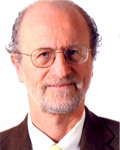 PAOLO DARIO is Professor of Biomedical Robotics at the Scuola Superiore Sant’Anna in Pisa, Italy. He has been Visiting Professor at Brown University, Providence, RI, USA; at the École Polytechnique Fédérale de Lausanne (EPFL), Lausanne, Switzerland; at the École Normale Superieure de Cachan, France; at the College de France, Paris, France; at the Polytechnic University of Catalunya, Barcelona, Spain; at Zhejiang University, Hangzhou, China; and at Waseda University, Tokyo, Japan.
PAOLO DARIO is Professor of Biomedical Robotics at the Scuola Superiore Sant’Anna in Pisa, Italy. He has been Visiting Professor at Brown University, Providence, RI, USA; at the École Polytechnique Fédérale de Lausanne (EPFL), Lausanne, Switzerland; at the École Normale Superieure de Cachan, France; at the College de France, Paris, France; at the Polytechnic University of Catalunya, Barcelona, Spain; at Zhejiang University, Hangzhou, China; and at Waseda University, Tokyo, Japan.
Dieter Fellner
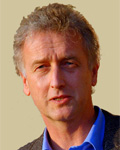 DIETER FELLNER is professor of computer science at the Technical University of Darmstadt, Germany, and the Director of the Fraunhofer Institute of Computer Graphics (IGD) at the same location. Previously he has held academic positions at the Graz University of Technology, Austria, the University of Technology in Braunschweig, Germany, the University of Bonn, Germany, the Memorial University of Newfoundland, Canada, and the University of Denver, Colorado. He is still affiliated with the Graz University of Technology where he chairs the Institute of Computer Graphics and Knowledge Visualization he founded in 2005.
DIETER FELLNER is professor of computer science at the Technical University of Darmstadt, Germany, and the Director of the Fraunhofer Institute of Computer Graphics (IGD) at the same location. Previously he has held academic positions at the Graz University of Technology, Austria, the University of Technology in Braunschweig, Germany, the University of Bonn, Germany, the Memorial University of Newfoundland, Canada, and the University of Denver, Colorado. He is still affiliated with the Graz University of Technology where he chairs the Institute of Computer Graphics and Knowledge Visualization he founded in 2005.
Alois Ferscha
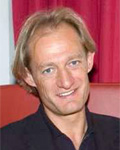 ALOIS FERSCHA was with the Department of Applied Computer Science at the University of Vienna at the levels of assistant and associate professor (1986-1999). In 2000 he joined the University of Linz as full professor where he heads the Excellence Initiative “Pervasive Computing”, the department of Pervasive Computing, the Research Studio Pervasive Computing Applications and RIPE (Research Institute of Pervasive Computing).
ALOIS FERSCHA was with the Department of Applied Computer Science at the University of Vienna at the levels of assistant and associate professor (1986-1999). In 2000 he joined the University of Linz as full professor where he heads the Excellence Initiative “Pervasive Computing”, the department of Pervasive Computing, the Research Studio Pervasive Computing Applications and RIPE (Research Institute of Pervasive Computing).
Elisabeth Giacobino
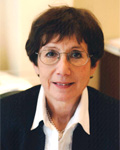 ELISABETH GIACOBINO is a CNRS Research Director at the Laboratoire Kastler Brossel, which is a joint research institute of the Ecole Normale Supérieure, the Université Pierre and Marie Curie and the Centre National de la Recherche Scientifique (CNRS). She studied physics at the Ecole Normale Supérieure in Paris, and received her PhD in Atomic Physics and Optics from the Université Paris VI. She has been an invited Professor at New York University and at the University of Auckland (New-zealand).
ELISABETH GIACOBINO is a CNRS Research Director at the Laboratoire Kastler Brossel, which is a joint research institute of the Ecole Normale Supérieure, the Université Pierre and Marie Curie and the Centre National de la Recherche Scientifique (CNRS). She studied physics at the Ecole Normale Supérieure in Paris, and received her PhD in Atomic Physics and Optics from the Université Paris VI. She has been an invited Professor at New York University and at the University of Auckland (New-zealand).
Kirsty Grant
 KIRSTY GRANT
is a Research Director at the Centre National de la Recherche in Gif sur Yvette, France. With more than 30 years experience in Neuroscience Research, her principle interests are in the dynamic representation of the sensory world with different levels of
complexity in neural networks of the brain, and in feedback mechanisms linking perception to action.
KIRSTY GRANT
is a Research Director at the Centre National de la Recherche in Gif sur Yvette, France. With more than 30 years experience in Neuroscience Research, her principle interests are in the dynamic representation of the sensory world with different levels of
complexity in neural networks of the brain, and in feedback mechanisms linking perception to action.
Chris Hankin
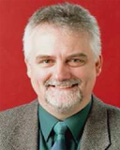 CHRIS HANKIN was appointed Professor of Computing Science in the Department of Computing at Imperial College London in 1995 having joined the College as a Lecturer in Computing in 1984. He holds a first degree in Computer Science from City University (London) and a PhD in Computer Science from the University of London (1979). He is currently Director of the Institute for Security Science and Technology and has previously been Deputy Principal of Engineering (2006-2008), Pro Rector for Research (2004-2006) and Dean of City and Guilds College (2000-2003).
CHRIS HANKIN was appointed Professor of Computing Science in the Department of Computing at Imperial College London in 1995 having joined the College as a Lecturer in Computing in 1984. He holds a first degree in Computer Science from City University (London) and a PhD in Computer Science from the University of London (1979). He is currently Director of the Institute for Security Science and Technology and has previously been Deputy Principal of Engineering (2006-2008), Pro Rector for Research (2004-2006) and Dean of City and Guilds College (2000-2003).
Norbert Kroo
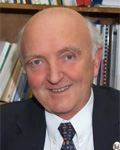 NORBERT KROO, Vice-President of the Hungarian Academy of Sciences, founding director of the Research Institute for Solid State Physics and Optics of HAS. He first used nuclear methods in condensed matter studies and later turned to laser physics and quantum optics. Surface plasmon optics is a typical field of this type. He published about 300 scientific papers and is the owner of 40 patents. He worked in several countries, and with outstanding scientist like Herbert Walter and Alexander Prokhorov.
NORBERT KROO, Vice-President of the Hungarian Academy of Sciences, founding director of the Research Institute for Solid State Physics and Optics of HAS. He first used nuclear methods in condensed matter studies and later turned to laser physics and quantum optics. Surface plasmon optics is a typical field of this type. He published about 300 scientific papers and is the owner of 40 patents. He worked in several countries, and with outstanding scientist like Herbert Walter and Alexander Prokhorov.
Maarja Kruusmaa
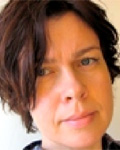 MAARJA KRUUSMAA is a professor at Center for Biorobotics (www.biorobotics.ttu.ee) at Tallinn University of Technology, Estonia. She received her Ph.D. at Chalmers University of Technology, Gothenburg, Sweden in Computer Engineering focusing on mobile robot learning and adaptation.
MAARJA KRUUSMAA is a professor at Center for Biorobotics (www.biorobotics.ttu.ee) at Tallinn University of Technology, Estonia. She received her Ph.D. at Chalmers University of Technology, Gothenburg, Sweden in Computer Engineering focusing on mobile robot learning and adaptation.
In 2002 she co-founded Intelligent Materials and Systems Lab in Tartu University of Technology, Tartu, Estonia, focusing on modeling, control and mechanical design of electroactive polymer artificial muscles.
Ren C.Luo
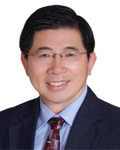 REN C.LUO (M’83–SM’88–F’92) received the Ph.D.degree in electrical engineering from
the Technische Universitaet Berlin, Berlin, Germany. He is currently an Irving T. Ho Chair
Professor in the Department of Electrical Engineering at National Taiwan University and
President of Robotics Society of Taiwan.
REN C.LUO (M’83–SM’88–F’92) received the Ph.D.degree in electrical engineering from
the Technische Universitaet Berlin, Berlin, Germany. He is currently an Irving T. Ho Chair
Professor in the Department of Electrical Engineering at National Taiwan University and
President of Robotics Society of Taiwan.
He also served two-terms as President of National Chung Cheng University in Taiwan. He was a Professor of Department of Electrical and Computer Engineering at North Carolina State University, Raleigh, NC, USA and Toshiba Chair Professor in the University of Tokyo, Japan.
Hiroshi Nagano
 HIROSHI NAGANO is presently Professor at the National Graduate Institute for Policy
Studies (GRIPS) in Tokyo.
HIROSHI NAGANO is presently Professor at the National Graduate Institute for Policy
Studies (GRIPS) in Tokyo.
After graduating from the faculties of Engineering and Law at Keio University, he joined the then Science and Technology Agency of the Prime Minister’s Office (the current Ministry of Education, Culture, Sports, Science and Technology) and dealt mainly with science and technology-related policy issues.
Prior to GRIPS, he headed up the National Institute of Science and Technology Policy (NISTEP) and then served as the Executive Director at the Japan Science and Technology Agency (JST).
José Del R. Millán
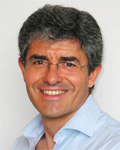 JOSÉ DEL R. MILLÁN is the Defitech Professor at Center for Neuroprosthetics of the Swiss Federal Institute of Technology in Lausanne (EPFL) where he explores the use of brain signals for multimodal interaction and, in particular, the development of non-invasive brain- controlled robots and neuroprostheses. In this multidisciplinary research effort, Dr. Millán is bringing together his pioneering work on the two fields of brain-machine interfaces and adaptive intelligent robotics.
JOSÉ DEL R. MILLÁN is the Defitech Professor at Center for Neuroprosthetics of the Swiss Federal Institute of Technology in Lausanne (EPFL) where he explores the use of brain signals for multimodal interaction and, in particular, the development of non-invasive brain- controlled robots and neuroprostheses. In this multidisciplinary research effort, Dr. Millán is bringing together his pioneering work on the two fields of brain-machine interfaces and adaptive intelligent robotics.
He received his Ph.D. in computer science from the Univ. Politècnica de Catalunya (Barcelona, Spain) in 1992, where he was an assistant professor for three years. He was also a research scientist at the Joint Research Centre of the European Commission in Ispra (Italy), a senior researcher at the Idiap Research Institute in Martigny (Switzerland), and a visiting scholar at the Universities of Stanford and Berkeley as well as at the International Computer Science Institute in Berkeley.
Rolf Pfeifer
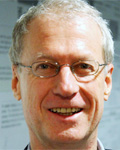 ROLF PFEIFER received his masters degree in physics and mathematics and his Ph.D. in computer science from the Swiss Federal Institute of Technology (ETH) in Zurich, Switzerland. He spent three years as a post-doctoral fellow at Carnegie-Mellon University and 10 at Yale University in the US. Since 1987 he has been a professor of computer science at the Department of Informatics, University of Zurich, and director of the Artificial Intelligence Laboratory.
ROLF PFEIFER received his masters degree in physics and mathematics and his Ph.D. in computer science from the Swiss Federal Institute of Technology (ETH) in Zurich, Switzerland. He spent three years as a post-doctoral fellow at Carnegie-Mellon University and 10 at Yale University in the US. Since 1987 he has been a professor of computer science at the Department of Informatics, University of Zurich, and director of the Artificial Intelligence Laboratory.
Having worked as a visiting professor and research fellow at Free University of Brussels (Belgium), the Beijing Open Laboratory for Cognitive Science (China), the MIT Artificial Intelligence laboratory in Cambridge, Mass. (US), the Neurosciences Institute (NSI) in San Diego (US), and the Sony Computer Science Laboratory in Paris (France), he was elected “21st Century COE Professor, Information Science and Technology” at the University of Tokyo, Japan, for 2003/2004, from where he held the first global, fully interactive, videoconferencing-based lecture series “The AI Lectures from Tokyo” (including Tokyo, Beijing, Jeddah, Warsaw, Munich, and Zurich). In 2009 he was elected as a "Fellow of the School of Engineering at The University of Tokyo". During 2009 he was also a visiting professor at the Scuola Superiore Sant'Anna in Pisa, Italy and at Shanghai Jiao Tong University in China.
Steen Rasmussen
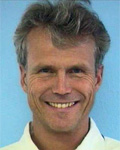 STEEN RASMUSSEN - Since Professor Steen Rasmussen’s Ph.D in Physics at the Technical University of Denmark
in 1985, his scientific activities have mostly focused on pioneering and implementing new
approaches, methods, and applications for self-organizing processes in natural and human
made systems.
STEEN RASMUSSEN - Since Professor Steen Rasmussen’s Ph.D in Physics at the Technical University of Denmark
in 1985, his scientific activities have mostly focused on pioneering and implementing new
approaches, methods, and applications for self-organizing processes in natural and human
made systems.
Professor Rasmussen is currently the Director for the Center for Fundamental Living Technology (FLinT http://www.sdu.dk/flint) at University of Southern Denmark (SDU), External Research Professor at the Santa Fe Institute (SFI), USA, Principle Investigator (PI) of the European Union (EC) sponsored Matrix for Chemical IT (MATCHIT) project and Co- PI for the EC sponsored Electronic Chemical Cell (ECCell) project.
Further he was the PI for the upstart of the Initiative for Society, and Policy (ISSP) in Denmark. During his 20 years in New Mexico, USA (1988-2007), he was the Team Leader for the Self-Organizing Systems (SOS) team at Los Alamos National Laboratory (LANL) and a Guest Professor at University of Copenhagen (2004-5).
Lu Rongkai
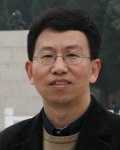
RONGKAI LU is now the Deputy Director General of the Bureau of International Cooperation, the National Natural Science Foundation of China (NSFC). He is personally in charge of the cooperation affairs with the Western European countries and the joint projects with funding organizations in these countries as well as with the European Union.
Tamas Roska
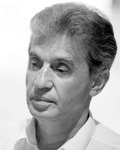 TAMAS ROSKA received the Diploma in electrical engineering from the Technical University of Budapest in 1964 and the Ph.D. and D.Sc. degrees in Hungary in 1973 and 1982, respectively. He is the Fellow of the IEEE and elected member of four Academies of Sciences in Europe.
TAMAS ROSKA received the Diploma in electrical engineering from the Technical University of Budapest in 1964 and the Ph.D. and D.Sc. degrees in Hungary in 1973 and 1982, respectively. He is the Fellow of the IEEE and elected member of four Academies of Sciences in Europe.
Since 1964 he has held various research positions, since 1982 he has been with the Computer and Automation Research Institute of the Hungarian Academy of Sciences where he is presently head of the Cellular Sensory and Wave Computing Research Laboratory and the Chairman of the Scientific Council. He is also a Professor and had been a founder Dean of the Faculty of Information Technology at the Pázmány P. Catholic University, Budapest. Since many years he is directing a Multidisciplinary Doctoral School. Since 1989 in each year, he has been a Visiting Scholar at the University of California at Berkeley. During the autumn semester of 2007 he had been a visiting endowed chair professor at the University of Notre Dame.
Michelle Simmons
 MICHELLE SIMMONS
MICHELLE SIMMONS
- BSc PhD (1985-1991) University of Durham, UK
- Post Doc (1992-1998) University of Cambridge, UK
- QEII Research Fellow (1999-2003) University of New South Wales, Australia
- Australian Research Council Federation Fellow (2003-)
- Centre Director Professor of Physics, University of New South Wales
- Federation Fellow Director Atomic Fabrication Facility
- Program Manager Atomic Fabrication and Crystal Growth
Sorin Solomon
 SORIN SOLOMON
SORIN SOLOMON
1984 PhD at Weizmann Institute in particles, quarks, super-strings 1982-1985 Bantrell Fellow at Caltech
1985-1989 Career Development Chair at Weizmann Institute
1989-Present: professor at the Hebrew University of Jerusalem in the field of Theoretical Physics.
In the 1990's he became one of the early proponents and world leaders in complexity. 1996 Introduced Interdisciplinary and Complexity courses and seminars at the Hebrew University.
1998 Organized a National Competition of Graduate Multidisciplinary Research. 2001 Founded in Jerusalem (with Henri Atlan and Irun Cohen) the Center for Complexity Science.
Janos Sztipanovits
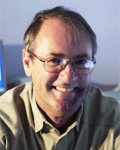 JANOS SZTIPANOVITS is currently the E. Bronson Ingram Distinguished Professor of Engineering at Vanderbilt University. He is founding director of the Institute for Software Integrated Systems (ISIS). His research areas are at the intersection of systems and computer science and engineering. His current research interest includes the foundation and applications of Model-Integrated Computing for the design of Cyber Physical Systems.
JANOS SZTIPANOVITS is currently the E. Bronson Ingram Distinguished Professor of Engineering at Vanderbilt University. He is founding director of the Institute for Software Integrated Systems (ISIS). His research areas are at the intersection of systems and computer science and engineering. His current research interest includes the foundation and applications of Model-Integrated Computing for the design of Cyber Physical Systems.



 Programme Committee
Programme Committee





